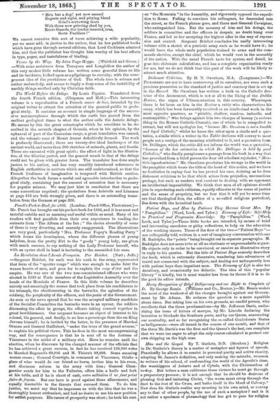desultory, and occasionally too didactic. The idea of this "popular
empire. He was one of the two non-commissioned officers who were library " is kindly, but it must wander less from its theme if it is to do elected in 1849 at Paris members of the Legislative Assembly over the heads of the Marshals of France. In this little volume be describes
naively and amusingly the scenes that took place from his candidature to Hasty Recognition of Rebel Belligerency and our Right to Complain of his triumph, the electioneering in the barracks, the agitation of the It. By George Bemis. (Williams and Co., Boston.)—Mr. Bemis makes soldiery, the perplexity of the officers, and the panic of the Government. the most of the weakest of all the charges brought against our Govern- As soon as the news spread that ho was the accepted military candidate ment by Mr. Adams. He reduces the question to a mere squabble of the Socialist Committee the barracks were in an uproar, the soldiers about dates. But taking him on his own grounds, no candid person, who discussing the affair in groups, the officers taking counsel together in recollects that the three proclamations—by Mr. Jefferson Davis, autho- great bewilderment. Our sergeant becomes an object of interest to his razing the issue of letters of marque, by Mr. Lincoln declaring the colonel, his general, and finally, to no less a personage than the ex-King intention to blockade the Southern ports, and by our Queen, announcing Jerome himself; he is invited by the latter, in the presence of Marshal our neutrality, and so far recognizing the so-called Confederate States Ornano and General Guillabert, "under the trees of the grand avenue," as belligerents—were all issued in the course of one month, and that of to explain his political views: This he does in the most uncompromising the three Mr. Davis's was the first and the Queen's the last, can complain way, and the consequence is that he is sent off to the fortress of that we were too eager to adopt the only course calculated to protect our Vincennes in the midst of a military riot. Here he remains until the own shipping on the high seas.
election, when he discovers by the changed manner of the officials that Mae and the Gospel. By T. Guthrie, D.D. (Strahan.) Religion he has achieved a great success, in fact he has received 128,998 votes in Dr. Gnthrie's theory is a matter of metaphor and figures of speech. to Marshal Bugeaud's 69,805 and M. Thiers's 99,098. Some amusing Practically he allows it to consist in personal purity and active charity, scenes ensue ; General Courtigis, in command at Vincennes, thinks a adopting St. James's definition, and only making the mistake, common glass of wine would do our friend no harm, invites him to his room, to writers of his school, of confounding the world of the Apostle's time, and discusses reform in the army with him ; General Chan- the worshippers of Astarte and of Cybele, with the Christendom of gamier sends for him to the Tuileries, offers him a knife and fork to-day. But before a man cultivates these virtues he must go through at his table, and if he is short of cash, entre militaires it ne fast point a preparatory process ; it is not enough that he should be desirous of faire de facons. But our hero is proof against these allurements, and pleasing God and imitating Christ, "the worm mast creep through the on "the Mountain " in the Assembly, and vigorously opposod tho expedi- tion to Rome. Failing to convince his colleagues, he descended into the street, as the French phrase goes, and there met General Cavaignac, who extinguished him. But the memory of him and his doings, the soldiers in committee and the officers in despair, no doubt hung over France, and led to her accepting the highest offer in the way of repres- yet we must add, in justice to the anther, that he has published books Bien and control. Sergeant Boichot concludes his really interesting which have gone through several editions, that Lord Cockburn admired volume with a sketch of a patriotic army such as he would have it ; he would have the whole male population trained to arms and the com- him, and that the publisher has thought him worthy of his best efforts mends elective, except the chief, which he would vest in the assembly of the nation. With the usual French taste for system and detail, he goes into elaborate calculations, and has a complete organization ready for use, but we do not think that this part of the work will be likely to attract much attention.






























 Previous page
Previous page